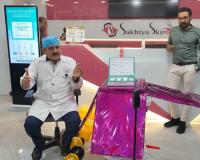NexCAR19 Marks a New Era: Exploring Promising Cancer Research and the Challenges of Pre-Clinical Trials

Ahmedabad (Gujarat) [India], September 25: With the recent success of NexCAR19 – India’s first approved CAR-T cell therapy for cancer cure, now is an opportune time to talk about and create more awareness about other upcoming and promising research in cancer treatment. In general, research focused on disease treatment goes through pre-clinical and clinical trial phases before reaching the target patients. Clinical trial is where the treatment is offered to patients, and the outcome of it further informs the trial. However, pre-clinical stage is where most of the challenge lies.
The pre-clinical stage calls for a combination of biotechnology and bioinformatics investigations. While biotechnology is relatively well-known, bioinformatics expands the scope of research and potential for success with much less financial overheads and minimal wet lab experimentation. We interviewed Sangeeta Shukla, Ph. D., a Bioinformatics Scientist for the Children’s Hospital of Philadelphia. We asked her about the background and current trends in bioinformatics research and its application in cancer treatment. Here is what she said.
“Arguably, the most notable initiatives in the history of bioinformatics began with the successful completion of the Human Genome Project in 2004. With most of the human genome sequenced, there was a lot of data available for scientists globally to employ modern bioinformatics algorithms to generate inferences about how diseases impacted the human genome, eventually leading to the development of advanced treatments with much improved outcomes. Investigating genomic variants, identifying genomic sites as hotspots for specific types of cancer and other diseases, and understanding the importance of genome outside of the intron-exon location, became possible. At CHOP, I worked on the Open Pediatric Cancer Analysis Project (OpenPedCan Project), which includes datasets from methylation array, mRNA gene expression, somatic mutation, as well as copy number, structural and variant results which inform NCI’sMolecular Targets Platform with a focus on pediatric cancer data. This platform allows users to browse and identify associations between molecular targets, diseases, and drugs, which is important for creating a baseline for clinical trials. Additionally, pediatric cancer is quite different from adult cancer in that it is more volatile. All the cancer treatments so far were devised based on trials conducted on adult patients, and it is important to generate such focused data so that newer trials can be conducted to make pediatric cancer treatments more effective.”
Dr. Shukla added that she is currently working with NIH’s Common Fund Data Ecosystem to make research data more dynamically available, and to enable more reproducible bioinformatics methods and algorithms become available to the scientific community via a cloud workspace to process the vast variety of data leading to greater success for the community as a whole. Notably, she received a spotlight feature in a ISCB magazine in April, 2024.
There is a lot of scope within the Indian scientific research community to come together and build such resources for data and processing. India is already a major hub for disease treatment for people in the Asian and African regions. With unlimited brain power from computer scientists, biologists, and bioinformaticians, we can harness greater capacity to generate inferences from a variety of ethnic biological data and hope to reach new-age scientific breakthroughs.
If you have any objection to this press release content, kindly contact pr.error.rectification@gmail.com to notify us. We will respond and rectify the situation in the next 24 hours.






